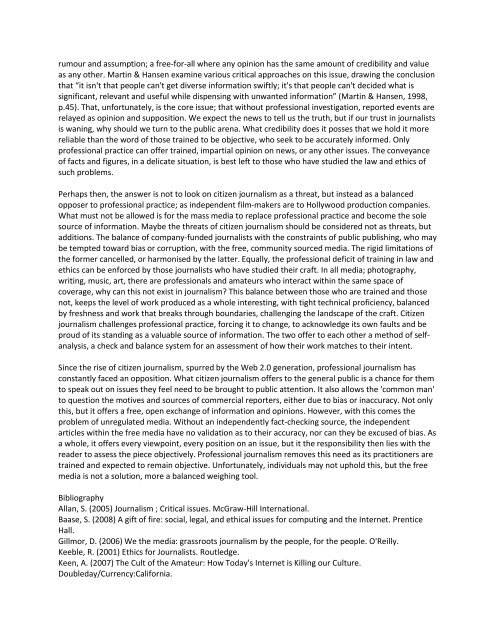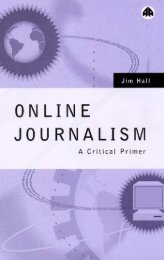Modul Mata Kuliah Journalisme Online - Ayo Menulis FISIP UAJY
Modul Mata Kuliah Journalisme Online - Ayo Menulis FISIP UAJY
Modul Mata Kuliah Journalisme Online - Ayo Menulis FISIP UAJY
You also want an ePaper? Increase the reach of your titles
YUMPU automatically turns print PDFs into web optimized ePapers that Google loves.
umour and assumption; a free-for-all where any opinion has the same amount of credibility and value<br />
as any other. Martin & Hansen examine various critical approaches on this issue, drawing the conclusion<br />
that “it isn't that people can't get diverse information swiftly; it's that people can't decided what is<br />
significant, relevant and useful while dispensing with unwanted information” (Martin & Hansen, 1998,<br />
p.45). That, unfortunately, is the core issue; that without professional investigation, reported events are<br />
relayed as opinion and supposition. We expect the news to tell us the truth, but if our trust in journalists<br />
is waning, why should we turn to the public arena. What credibility does it posses that we hold it more<br />
reliable than the word of those trained to be objective, who seek to be accurately informed. Only<br />
professional practice can offer trained, impartial opinion on news, or any other issues. The conveyance<br />
of facts and figures, in a delicate situation, is best left to those who have studied the law and ethics of<br />
such problems.<br />
Perhaps then, the answer is not to look on citizen journalism as a threat, but instead as a balanced<br />
opposer to professional practice; as independent film-makers are to Hollywood production companies.<br />
What must not be allowed is for the mass media to replace professional practice and become the sole<br />
source of information. Maybe the threats of citizen journalism should be considered not as threats, but<br />
additions. The balance of company-funded journalists with the constraints of public publishing, who may<br />
be tempted toward bias or corruption, with the free, community sourced media. The rigid limitations of<br />
the former cancelled, or harmonised by the latter. Equally, the professional deficit of training in law and<br />
ethics can be enforced by those journalists who have studied their craft. In all media; photography,<br />
writing, music, art, there are professionals and amateurs who interact within the same space of<br />
coverage, why can this not exist in journalism? This balance between those who are trained and those<br />
not, keeps the level of work produced as a whole interesting, with tight technical proficiency, balanced<br />
by freshness and work that breaks through boundaries, challenging the landscape of the craft. Citizen<br />
journalism challenges professional practice, forcing it to change, to acknowledge its own faults and be<br />
proud of its standing as a valuable source of information. The two offer to each other a method of selfanalysis,<br />
a check and balance system for an assessment of how their work matches to their intent.<br />
Since the rise of citizen journalism, spurred by the Web 2.0 generation, professional journalism has<br />
constantly faced an opposition. What citizen journalism offers to the general public is a chance for them<br />
to speak out on issues they feel need to be brought to public attention. It also allows the 'common man'<br />
to question the motives and sources of commercial reporters, either due to bias or inaccuracy. Not only<br />
this, but it offers a free, open exchange of information and opinions. However, with this comes the<br />
problem of unregulated media. Without an independently fact-checking source, the independent<br />
articles within the free media have no validation as to their accuracy, nor can they be excused of bias. As<br />
a whole, it offers every viewpoint, every position on an issue, but it the responsibility then lies with the<br />
reader to assess the piece objectively. Professional journalism removes this need as its practitioners are<br />
trained and expected to remain objective. Unfortunately, individuals may not uphold this, but the free<br />
media is not a solution, more a balanced weighing tool.<br />
Bibliography<br />
Allan, S. (2005) Journalism ; Critical issues. McGraw-Hill International.<br />
Baase, S. (2008) A gift of fire: social, legal, and ethical issues for computing and the Internet. Prentice<br />
Hall.<br />
Gillmor, D. (2006) We the media: grassroots journalism by the people, for the people. O'Reilly.<br />
Keeble, R. (2001) Ethics for Journalists. Routledge.<br />
Keen, A. (2007) The Cult of the Amateur: How Today's Internet is Killing our Culture.<br />
Doubleday/Currency:California.
















